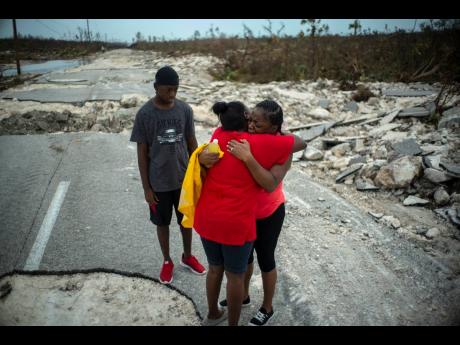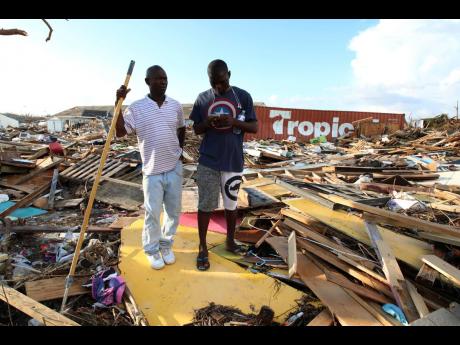Orville Taylor | Dorian – no man is an island
Years ago, I wrote that hurricanes are formed west of the African coast and followed the path of the slave ships all the way up into the New World. It is not coincidence, rather, it is simply basic meteorology, where the 16th-century navigators followed the trade winds. However, it is also coincidental that these tropical cyclones have typically been overly selective in hitting and devastating countries or cities with large African populations.
Disproportionately, the close to 30 million African descendants who live in the Caribbean, Central, and northern South America have borne the wrath of most of the tropical cyclones that follow the slave route. In fact, going north, the Florida, whose native black population is around three million, approximately 15 per cent of the population is also in the firing line. Add to that the Carolinas, with 30 per cent of their black residents originating from enslaved Caribbean blacks whose ‘captors’ took them to the USA after emancipation. At 3.7 million, 25 per cent of its occupants are black. Louisiana’s 1.4 million blacks comprise 32 per cent of its population, with New Orleans having a population of more than 340,000, representing 60 per cent.
Interestingly, despite the ‘black’ Sharpie marker, Alabama does have a large 26 per cent black population, comprising 1.2 million dwellers. True, it was never in the predicted path of Dorian. However, it is part of the hurricane belt.
In the Caribbean, including the American territory of Puerto Rico, with 340,000 self-reported Africans but with a much higher set of ‘negados’, Haiti, with its nine million Africans, has also taken more than its fair share of natural disasters, including earthquakes.
No one needs to be reminded of how much annual damage is caused by hurricanes. On average, annual US damage by hurricanes is billed at US$21 billion, for a total of US$862 billion between 1980 and 2018.
God’s wrath
Of course, some of my readers who believe in deep spiritual connections are quick to argue that it is souls of our angered or lost ancestors that continue to haunt us in attempting to seek reparation, repatriation, and restitution. Some even go so far as to suggest that it is the angry God who has wreaked vengeance on our Sodom and Gomorrah, as well as devil-worshiping, nation. Well, it is funny that churches have suffered major damage in many of our tropical cyclones. But then again, God might know something about the pastors that we don’t know.
Seriously, though, the sobering fact is that in countries, especially flat island nations, hurricanes are real threats, and in a vulnerable space like the CARICOM Basin, the only island that can stand is the one called ‘No Man’. You won’t find it anywhere on the map, but oftentimes, it lies deep in the mind of parochials who can see past their narrow self-interests or egos. In CARICOM, there is a wide variance in living standards. At US$26,900 per annum, compared to US$737 for Haiti and Jamaica at US$5,000, The Bahamas can be excused for feeling that their fragile archipelago can stand on its own.
There is no comfort in making fun of the arrogant utterances of Bahamian Prime Minister Hubert Minnis, who declared in March that there was no free movement in his nation for other CARICOM nationals. As Hurricane Dorian sat over Grand Bahama like the bad blood between the two PNP campaigns, moving as slowly and deliberately as the diction of two noted geriatric politicians, many other Anglophone Caribbean citizens sneered.
Truth is, ignorance is often its own punishment, and Dorian is a reality cheque that Minnis and other isolationists cannot cash. It is yet unknown how much damage the deadly Category Five storm caused in the country with the highest GDP per capita in CARICOM. However, the death toll was last at 30, with the infrastructure damage likely to get into hundreds of millions. Importantly, the Caribbean Sea and Atlantic Ocean have no boarding pass.
Yet, The Bahamas, with its rich economy, also has its communities of ghettos with poor infrastructure. Many poor Bahamians and Haitian immigrants live on Abaco, and from what we have seen, the domiciles were not as strong as our Greater Portmore residences. Hurricanes have no understanding of visa requirements. Therefore, when mother nature comes calling, nothing stops her.
CARICOM unity
Still, while the response across the Caribbean has typically been strong, with my plantation, The University of the West Indies (UWI), being in the thick of things in providing assistance whenever a CARICOM nation is hit, Minnis’ caricatured foot-in-mouth diatribe is not an outlier. Much of the so-called advocacy for Caribbean inter-state unity has been mostly cosmetic, with men who talk the talk and never walk the walk. CARICOM unity will never occur until at the deep sociological, cultural, or psychological level, the average citizen is made to understand what it means and where their leaders truly are.
They cannot even find true consensus in selecting the West Indian cricket team. Moreover, the ouster of the highly successful Jamaican, Dave Cameron, by a small group who seemed to have promised to support him but did the opposite goes to the heart of the CARICOM dilemma. It is also not insignificant that some of the advocates for the Caribbean Court of Justice hypocritically carry forward their QCs with great glee. Add to that the paradox of an independent cadre of British title holders who are keener on holding these vestiges of colonialism as opposed to implementing a comparable honour that represents us.
Indeed, I would love to see the current UWI chancellor be the first recipient of this reformatted Order of the Caribbean Community. Thus, without the strictures of being bound to the monarchy, he had to have the locus standi to not just mishandle an ever-changing game with egotistical men who play with small tough balls, score no runs, and merely embarrass us.
Dorian is a powerful storm. Hopefully, it will blow some sense into us.
- Dr Orville Taylor is head of the Department of Sociology at the UWI, a radio talk-show host, and author of ‘Broken Promises, Hearts and Pockets’. Email feedback to columns@gleanerjm.com and tayloronblackline@hotmail.com.


